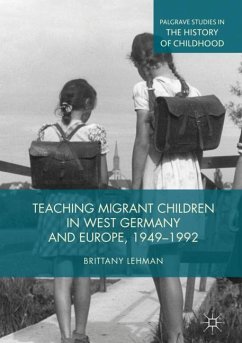This book examines the right to education for migrant children in Europe between 1949 and 1992. Using West Germany as a case study to explore European trends, the book analyzes how the Council of Europe and European Community's ideological goals were implemented for specific national groups. The book starts with education for displaced persons and exiles in the 1950s, then compares schooling for Italian, Greek, and Turkish labor migrants, then circles back to asylum seekers and returning ethnic Germans. For each group, the state entries involved tried to balance equal education opportunities with the right to personhood, an effort which became particularly convoluted due to implicit biases. When the European Union was founded in 1993, children's access to education depended on a complicated mix of legal status and perception of cultural compatibility. Despite claims that all children should have equal opportunities, children's access was limited by citizenship and ethnic identity.








